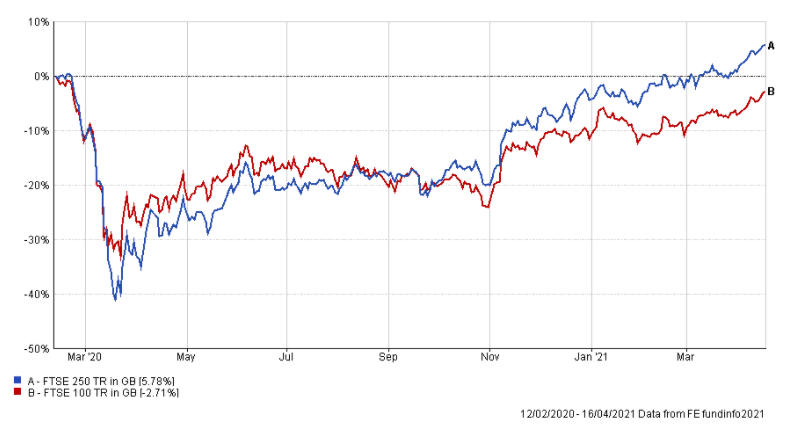As the UK basked in sunshine and continued its move out of lockdown with the reopening of non-essential retail, pubs, and hairdressers, the buoyant mood was reflected in its investment markets. Having lagged other developed markets in recovering from the pandemic, the FTSE 100 hit a major milestone reaching 7,000 for the first time since the pandemic struck. Although 7,000 is below its pre-pandemic level, it is of psychological importance to investors, reflecting the positive outlook for the companies in the index as the global economy continues its recovery.
Green light for stock markets
We have written in past months that the UK stock market has lagged its peers due to the cyclical nature of many of its constituents. These companies in sectors such as energy and leisure have suffered with falling demand because of lockdown but could be a major beneficiary of a recovery from the pandemic. The International Monetary Fund has forecast the UK economy will grow over 5% annually in the short term, the fastest level of any G7 country. This positive outlook has been reflected by the FTSE 250 (viewed as a more accurate bellwether for UK domestic performance) which has recovered beyond its pre-pandemic level to reach new record highs.

Investment markets, and the narratives that drive them, move fast. This is most obvious in the US where only weeks ago, concerns were high over rising inflation and the impact rising yields would have on equity valuations. This uncertainty caused a minor sell off in late February and early March as investors began to reassess their portfolios and the place of fixed interest securities within them. Since then, the focus has turned to the global economic recovery and with continuing support from governments and central banks the US stock market has rebounded to set new all-time highs almost daily in April.

The Dow Jones traded at over 34,000 for the first time ever, with the S&P 500 in touching distance of 4,200. To put these numbers in context, at the start of 2020, before Covid impacted global stock markets, these indexes traded at 28,000 and 3,200 respectively.
Covid resurgence in developing markets
Investment markets in recent months have been rising because investors are forecasting a strong recovery as countries recover from Covid. This all hangs on economies moving out of lockdown and pent-up demand encouraging economic growth. It is a concern therefore that while Covid cases have fallen dramatically in the UK, and with hospitals now at a manageable level to allow lockdown easing, that daily numbers of new cases worldwide have once-again reached record levels.

These large outbreaks are in developing countries. India, Brazil, and Turkey particularly are facing rising case numbers and the concern for our economic recovery is the potential for a new vaccine-resistant variant to emerge and threaten the reimposition of lockdown measures. India has been added to the UK’s travel red list for this reason as the positive work that has been done in the pace of our vaccination programme could be undone should the vaccines prove less useful.
Regardless of this, it remains a positive environment for equities, and certainly much more positive than this time a year ago. However, as mentioned we have stock markets at all time highs and with valuations stretched, any news story giving a cause for concern will likely see some profit taking on these assets. Given the positive environment however it would be expected that any sizeable dips would be bought quickly.
Currency movements
The strength of the UK vaccination programme has also been a driver in currency markets as it could allow the reopening of the UK economy before other countries can do so. In April last year Pound Sterling was worth around $1.24 and is now trading around $1.39 having been as high as $1.42 in late February. This strength is partly due to optimism surrounding the UK’s vaccination programme and how this feeds into the lifting of restrictions. The stronger economy that might result is a boost for Sterling, although again any hiccup in the programme would be a headwind.
Cryptocurrencies remain a speculative asset. Bitcoin having extended its rally to over $64,000 in early April, fell back over 15% as the Turkish central bank said it would ban digital assets as a form of payment while reports intimated that the US Treasury is poised to crackdown on what is perceived as money laundering using the asset. Other cryptocurrencies have seen similar speculative movements as investors seek to jump on the bandwagon and chase gains.
Invitation
If you would like to discuss your financial plan and investment strategy, then we would love to hear from you. Get in touch with your Financial Planner here at Vesta Wealth in Cumbria, Teesside and across the North of England.
Reach us via:
t: 01228 210 137
This content is for information purposes only. It should not be taken as financial or investment advice. To receive personalised, regulated financial advice regarding your affairs please consult your Financial Planner here at Vesta Wealth in Cumbria, Teesside and across the North of England.

